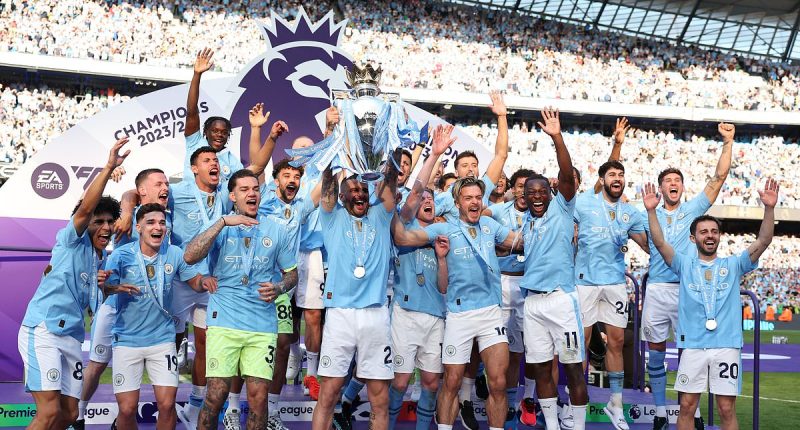Share this @internewscast.com
Manchester City chairman Khaldoon Al Mubarak breaks into a chuckle during his latest end-of-season chat with the club’s in-house media, when the subject of a long-awaited ruling on 115 allegations of financial impropriety crops up.
‘It will come, and we’ll talk about it, I promise you, once we have the ruling,’ he says in his impeccable American English, sounding less like a man fearing his club’s reputation is about to be trashed than one who is waiting for his moment to let the Premier League have it, both barrels.
On Wednesday it will be 180 days since the independent commission which heard the charges against City began considering their verdict. By contrast, UEFA took just two days to find City guilty of financial manipulation on the basis of similar evidence, in January 2020 – a verdict later overturned on appeal.
At the very least, the hiatus points to uncertainty about the evidence put before the commission, which sat for 12 weeks between last September and December.
In what feels like a professional lifetime ago, I covered the intricate, complex trial of GP Harold Shipman, on 15 charges of murder. It took a lay jury in Preston 118 days to hear and decide on that evidence – 60 days fewer than three highly specialised experts have taken to assess City.

Manchester City chairman Khaldoon Al Mubarak celebrates last year’s title with Pep Guardiola

Al Mubarak, with US President Donald Trump, does not seem concerned about the 115 charges

City have won eight Premier League titles since their Abu Dhabi-backed takeover back in 2008
View the City case through the prism of the hacked emails from club executives, published by German newspaper Der Spiegel, which are at the core of it, and you would say there’s a very strong case against them.
Cosy promises of £12million extra, from ‘alternative sources provided by His Highness‘. Assurances to prime sponsor Etihad Airlines that ‘you will provide £8m’ of a £99m sponsorship commitment.
But City, who deny any wrongdoing, have always found some element of deniability about this evidence. The ‘alternative sources’ were ‘grants’ made available by the Abu Dhabi Tourist Authority. Puzzled junior staff had simply not understood the mechanics of the sponsorship system when sending seemingly incriminatory emails.
There has been no Abu Dhabi executive found unwittingly hinting at being on the hook for far more than the published sponsorship sum.
The closest we come to a smoking gun was City’s own admission, in a UEFA hearing, that Jaber Mohamed – a senior aide of Abu Dhabi’s Crown Prince – paid the club £30m on the behalf of main sponsor Etisalat, a state-owned telecoms company, in 2012 and 2013 – when we rather presupposed the company would be stumping up themselves. This sponsor appeared to pay City no cash for three years.
But to convict City, the commission will have to conclude both the club and executives at the top of state-owned Abu Dhabi companies such as Etisalat and Etihad Airlines were part of the conspiracy, says football financial expert Kieran Maguire. ‘That’s a high threshold of proof,’ he tells me. ‘There would have had to be co-ordinated lying.’
Maguire points out it will have been the professional duty of City’s external accountants BDO LLP to forensically scrutinise the club’s books. Though fraud can be notoriously hard to detect, BDO would have had to be either hoodwinked by Abu Dhabi, or party to anything untoward. That’s improbable.
Allegations that the salaries of former manager Roberto Mancini and midfielder Yaya Toure were vastly inflated by off-the-books Abu Dhabi payments – another part of the Premier League charge sheet – would have been best tested by those individuals appearing to testify. Neither Mancini nor Toure could be subpoenaed by a commission like this.

City’s lawyer Lord Pannick arrives at last year’s hearing into their alleged financial breaches

Part of the Premier League charge sheet are allegations that the salaries of former manager Roberto Mancini and midfielder Yaya Toure were vastly inflated by off-the-books payments
The Premier League have been right to bring this case. Those leaked emails painted a deeply suspicious picture of City’s interactions with opaque, state-owned Abu Dhabu entities of which we know very little, given the Gulf state has no equivalent of our own Companies House.
A brilliant book covering this case and much more, Miguel Delaney’s award-winning States of Play, lays bare the flaws in UEFA’s investigation. The Premier League will certainly have improved on their work.
All told, it feels like a case with moral and intellectual validity, though such merits never bring guarantees of conviction in the balance of probabilities.
Al Mubarak seems more interested in City’s imminent Club World Cup campaign in the US. ‘We’re holders,’ he reminds City TV, wearing the broad grin of a man without a care in the world.
Brum on top for EFL value
I experienced few better atmospheres in the football season just concluded than the thundering environment of St Andrew’s, where I saw Birmingham City come from behind to thump Wrexham and run Newcastle United close in the FA Cup. Wow!
The stadium was the best-value place to watch the EFL, based on my loose calculation – dividing the cost of each club’s cheapest season ticket by the number of points each side has secured at home.
It’s £5.16 per home point for Blues fans, followed in descending order by Fleetwood (£5.70), Charlton (£6.07) and Doncaster (£6.30). Worst performers from the bottom up: Shrewsbury Town, Cambridge United, Carlisle United and Barnsley.
There’s such immense value in watching EFL football and substantially more chance of something joyous at the end of it all than the tooth-and-nail existence that life in the Premier League entails for most.

St Andrew’s was the best-value place to watch the EFL, each home point costing roughly £5.16

Charlton, who won promotion from League One, gave their home fans the EFL’s third best value
A solution to French Open gender row
The perennial complaint about the French Open’s women’s tournament being granted none of the prime-time evening TV slots presents an obvious solution.
Extend matches in the latter stages of the women’s tournament to five sets. More exposure. More of those titanic comebacks we associate with the men’s game.
Billie Jean King proposes best-of-three for the first week and best-of-five for the second.
When Bjorn Borg won at Roland Garros in 1974 and 1975, the men were playing best-of-three for the first two rounds and best-of-five for the rest. It did him no harm.

Bjorn Borg won Roland Garros in 1974 & 1975 playing best-of-three sets in the first two rounds
The horror that Liverpool parade attack revealed
It was moving to witness at first hand the solidarity and sense of community in Liverpool, the morning after the fleeting horror of the trophy parade, last week.
But so much of that episode and its aftermath is unsettling.
A motorist drives into a crowd, to find his car windows being smashed, the vehicle being rocked.
Police are forced to supply rapid information on the suspect – since charged – to prevent race riots from ensuing. It’s an unremittingly furious world out there.












